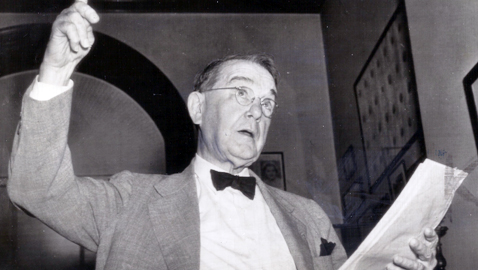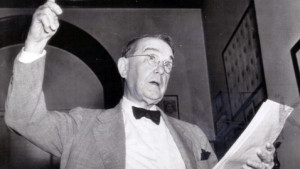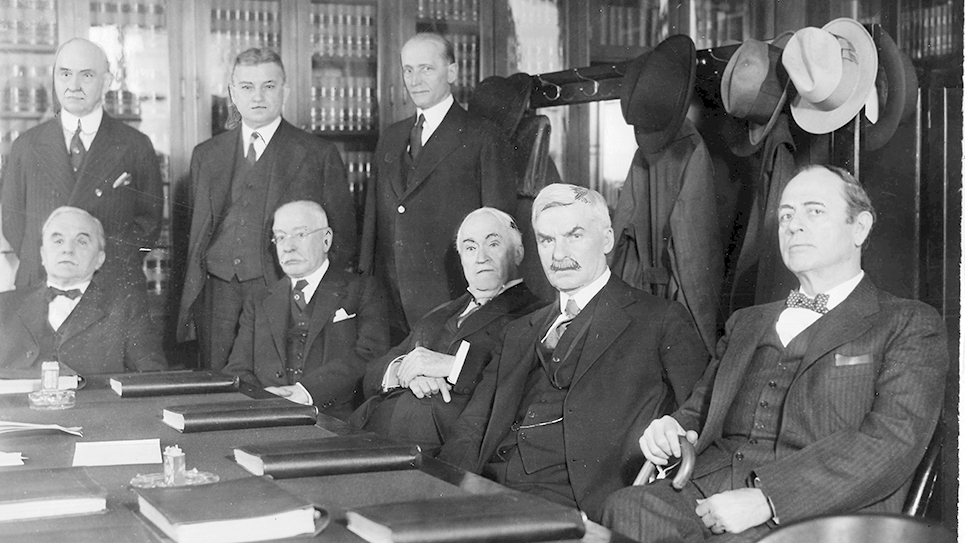America’s entry in World War II brought significant changes to society and to Washington, D. C. The population of the nation’s Capitol quite nearly doubled over a period of months; rationing went into effect, affecting the availability of meat, butter, sugar, gasoline and tires for automobiles. Even fashions were affected by the war effort as dresses became shorter; cuffs disappeared, as did vests for men, in order to save valuable materials like cotton and wool. Many items that were part of daily life soon became very hard to get; for example, nylon stockings for women were considered a luxury and became hard to find.
The availability of housing in Washington, D. C. became scarce and rents skyrocketed due to the surge in the population of new workers staffing the various war agencies and Federal bureaucracy. Prior to the war, it was not unusual for Congress to be in session for five months of the year, leaving members with the ability to be at home for the other seven. With the attack on Pearl Harbor by the Japanese Empire, life in America changed profoundly for everyone, including the members of Congress.
Congressional sessions were longer, the demands on Congressmen and senators far greater. Tennessee’s senior United States Senator, Kenneth D. McKellar, was seventy-three years old in 1942. McKellar was one of the more senior members of the Senate and the Tennessean was acknowledged to be one of the most powerful members of Congress.
In November of 1942, the Senate was debating a civil rights bill to eliminate the poll tax and Southern senators started a filibuster to prevent the bill from passing, prolonging the session. Most Southern states had instituted a poll tax, meaning to be able to vote in elections one had to pay the poll tax. Most Southern states, to keep African-Americans from voting in elections, had introduced the poll tax, as well as requiring literacy tests as a requirement for voting.
The war was not going especially well for the Allied powers in 1942 and voters had been angry and frustrated, costing Democrats nine seats in the Senate. Alben Barkley of Kentucky was the Majority Leader of the United States Senate and the Kentuckian was one of Kenneth McKellar’s warmest personal friends in the Senate. As the filibuster went on for five very long days, Barkley became increasingly irritated and determined to bring the filibuster to an end. During a Saturday session of the Senate, Barkley sought an order, which would allow the Senate’s Sergeant At Arms, Chesley W. Jurney, to compel the attendance of Southern senators who were absent from the Capitol to provide the necessary quorum to conduct business.
Jurney was an affable white-headed gentleman from Texas and had been the Senate’s Sergeant At Arms ever since the Democrats came back to power in 1933. Jurney sent Deputy Sergeant At Arms Mark Trice to fetch recalcitrant members of the Senate. Young Mark Trice, aware of the irascible Tennessean’s temper and power, tremulously asked Barkley, “Do you mean Senator McKellar, too?
“I mean everybody!” Barkley roared in reply.
Trice set out to return with the senior U. S. Senator from Tennessee, Kenneth D. McKellar.
McKellar lived in an apartment in the elegant Mayflower Hotel while in Washington and Trice dutifully arrived at the Mayflower and tried telephoning McKellar’s rooms. Receiving no answer, Trice convinced a maid to knock on Senator McKellar’s door. McKellar answered and Trice quickly explained that the senator was needed at the Capitol on urgent business. McKellar agreed to return to the Senate with Trice and by the time the limousine reached the Capitol grounds, the Senator saw the lights and he realized exactly what was going on and his famous temper began to rise.
McKellar shot out of the car and hurried down the corridor to find out who had summoned him.
The “arrest” of the old Tennessean was to have serious repercussions, both politically and personally. McKellar was so angry with his friend Alben Barkley, he refused to speak to him for nine months, something that profoundly depressed the Kentuckian, especially as they sat beside one another on the Senate floor. McKellar did not forget Sergeant At Arms Chesley Jurney’s role in his arrest. The Senate routinely elected its officers at the beginning of every Congress and Texas U. S. Senator Tom Connally got up before the Democratic caucus to nominate Jurney for another term as Sergeant At Arms. McKellar rose and placed in nomination Wall Doxey; Doxey had been elected to the Senate from Mississippi in a 1941 special election, but had lost his seat in 1942. Another senator, allied with McKellar, stated there were some financial improprieties in the operation of the Sergeant At Arms’s office and when Senate Democrats proposed an investigation of those charges, Jurney withdrew as a candidate and Wall Doxey was elected to replace him. It was not only a demonstration of Kenneth McKellar’s power inside the Senate, but his shrewdness.
Alben Barkley’s depression at having McKellar seriously angry with him was even mentioned to President Franklin D. Roosevelt. The President seemed not to care and took the genial Kentuckian for granted. When the need for more revenue due to the war led to Roosevelt pressing Barkley to pass a bill raising taxes by ten billion dollars, Barkley responded and worked diligently to do the best that he could, cobbling together a bill that could pass the Senate, although the new bill contained far less than the President had wanted. Senator Barkley went to the White House twice to personally meet with Roosevelt and assured him the bill was likely the best he was going to get and begged him to accept it. To Barkley’s dismay, FDR vetoed the bill the Kentuckian worked so hard to pass.
Alben Barkley was considered the most loyal of all Franklin Roosevelt’s loyalists in the United States Senate and for good reason. Barkley had barely won his initial election as Majority Leader in 1937, when he defeated Mississippian Pat Harrison by a single vote. The tension in the Democratic caucus was so high and Barkley so nervous, he bit the stem of his pipe in two. Barkley’s election as Majority Leader had come with the not so tacit support of President Roosevelt. For many members of the Senate, Barkley was less the leader of Senate Democrats than he was the personal spokesman of Franklin Roosevelt. When FDR referred to the tax bill pushed by Alben Barkley through the Senate at his own request as being “not for the needy, but the greedy”, a furious Barkley took to the Senate floor to defend the bill, himself and the Senate.
The Senate chamber was packed as a furious Barkley began his speech. Kenneth McKellar, still not speaking to the Majority Leader, sat at his desk beside Barkley, listening as he fingered the Phi Beta Kappa key attached to the watch chain of his vest. Barkley frankly condemned Roosevelt for his “deliberate and unjustified statements.” The Kentuckian told a hushed Senate the President’s veto message was nothing less than a full frontal assault on the integrity of the Congress.
Barkley assailed Franklin Delano Roosevelt in his speech, daring to actually ridicule the President, an experience that was rare for Roosevelt and unprecedented for the normally faithful Kentuckian. Referring to the portion of the tax bill which placed a new tax on timber, Barkley thundered with deadly sarcasm, “The President cites his own experience as a timber man. I do know that he sells Christmas trees at Christmas time. But to compare these little pine bushes with a sturdy oak, gum, poplar or spruce is like comparing a cricket to a stallion.”
Barkley’s speech was his own personal declaration of independence from Franklin Roosevelt. Senator Barkley told his fellow lawmaker’s and the packed Senate galleries he was resigning as Majority Leader in protest. The next morning, the Democratic caucus met to consider Barkley’s dramatic resignation as Majority Leader.
Senator McKellar was so pleased by Barkley’s display, he cried, “I forgive him everything!”
Kenneth McKellar presided over the Senate Democratic caucus and Barkley’s resignation delighted the Tennessean, who immediately forgave his old friend for having had him arrested during the filibuster. Senate Democrats promptly and unanimously reelected Barkley as Majority Leader.
Barkley’s bitterness and resignation so surprised Franklin Roosevelt the President gasped that the Kentuckian must have lost his mind. If Roosevelt failed to get the point after Barkley’s speech, he could not help but realize his own position was seriously weakened when the Senate joined the House in overriding Roosevelt’s veto of the tax bill.
Senator McKellar appeared in newsreels congratulating Barkley and happily pointed out to the gathered reporters the mountain of approving telegrams which had buried the Kentuckian’s massive desk.
Although Alben Barkley had begun his famous speech noting he spoke without regard for the political consequences, there were indeed serious consequences; in fact, that speech may well have cost Barkley the presidency. It appeared obvious to all, FDR would dump Vice President Henry Wallace from the ticket in his bid for a fourth term; the only person who seemed oblivious to that fact was Wallace himself. Many believed Roosevelt would have chosen Barkley except for his irritation at Barkley’s speech denouncing him. Instead, Roosevelt accepted little known Missouri Senator Harry Truman as his running mate.
Senator McKellar, having installed his own Sergeant At Arms, and delighted by Barkley having asserted his independence from Franklin Roosevelt, resumed his cordial relations with his colleague from Kentucky.








